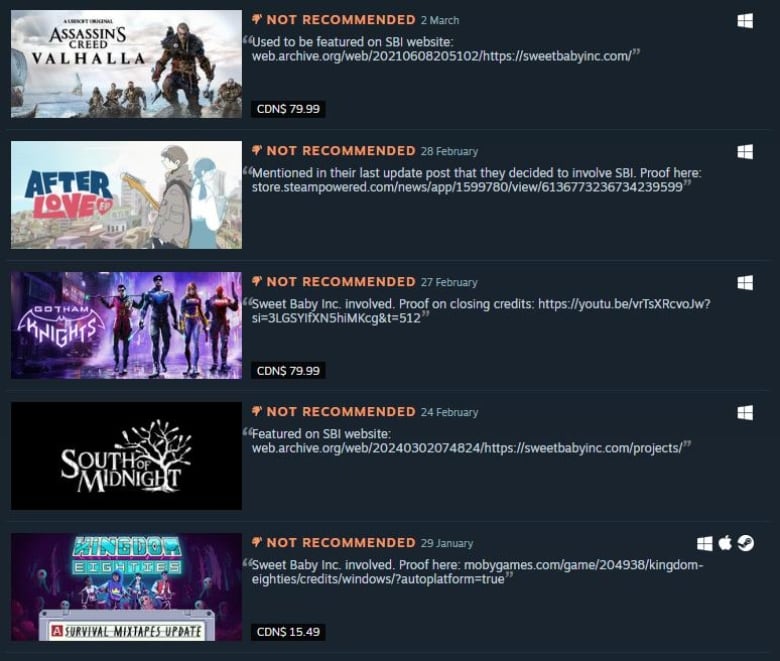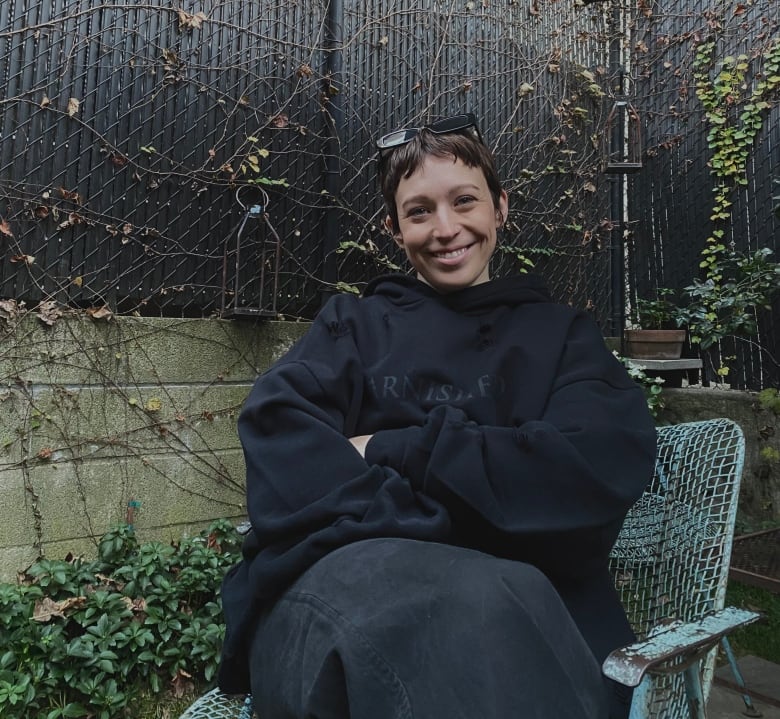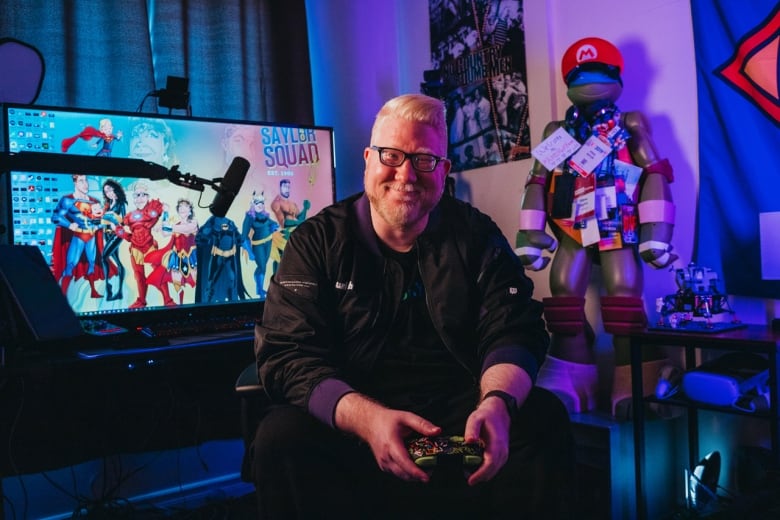The Current19:48Opponents of diversity in gaming target Canadian consulting firm
Kim Belair says she wasn’t surprised at the harassing and threatening messages that she and her team have been receiving since last fall. Still, their details have been enough to shake them.
That included threats of violence, suggesting they should kill themselves or each other, and even graphic photos, said Belair, CEO and co-founder of Montreal-based Sweet Baby Inc., a video game consulting company.
“It’s not something that’s entirely new to us, especially to our marginalized team members who have existed in this industry … for quite some time.”
Belair’s 16-person team has become the centre of a new storm of online arguments, conspiracy theories and harassment, as self-described gamers accuse them of pushing a “radical leftist” agenda into games they claim players — and even developers themselves — want no part of.
“They said they want to take over the games industry. They hate white, straight, male gamers,” said commentator Ryan Kinel, in a video on YouTube, where he has over 300,000 followers.
Some have likened the backlash to Gamergate, a harassment campaign mostly targeting women in the video game industry that began in 2014.
The online storm even caught the attention of X owner Elon Musk.
“Sweet Baby Inc is an evil blight on the gaming industry. All they do is make games terrible and try to cancel people,” Musk posted on X, formerly known as Twitter, on March 16. “They cannot go broke soon enough!”
The past several months have seen a rise in “organized harassment against anyone who has been associated with the company,” Alyssa Mercante, senior editor at the video games site Kotaku, told The Current‘s Matt Galloway.
The Sweet Baby ‘detected’ group
Sweet Baby was founded in 2018 and works with video game companies on projects ranging from small independent titles to AAA blockbusters like Assassin’s Creed Valhalla and Suicide Squad: Kill the Justice League.
Belair says its services include writing feedback, narrative direction and helping “punch up” scripts — but also “consultations around perspective and identity.”
That last element started to gain attention in October 2023, after users on message boards noticed the studio was credited on two big-budget newly released games: Marvel’s Spider-Man 2 and Alan Wake 2.
Though both games were critically acclaimed, some said Sweet Baby made unwanted changes during development, including changing Alan Wake 2 protagonist Saga Anderson from a white woman to a Black woman, which the game’s director has denied.

Others blamed the studio’s work on Suicide Squad for that game’s middling reviews and lagging sales. Warner Bros. Discovery said the game fell short of expectations, but did not give specifics.
The discourse intensified in January, when a user created a tracking page on the online games store Steam called “Sweet Baby Inc detected.”
The page, which currently has over 355,000 followers, tracks games with which Sweet Baby has been involved — and marks them all as “not recommended.” The label does not affect any games’ visibility on the store.

Its creator, who uses the online name Kabrutus, said Sweet Baby “forces political agendas and DEI [diversity, equity and inclusion] into their games,” in an interview with the site Geeks + Gamers on March 7.
“I started noticing patterns in some games, like ugly women, and male characters being weakened to make female ones look stronger.”
Kabrutus declined to comment to CBC News for this story.
Several Sweet Baby staff members posted on X about their displeasure with the tracker; one staff member called for users to report the Steam page and its creator. Some have argued that only gave the detractors more attention.
Kabrutus and his supporters accused Sweet Baby of censorship.
Belair denied that claim, saying the studio chose not to reach out Steam’s parent company, Valve.

Belair says the accusations revealed a misunderstanding of the scope and nature of game consulting.
Sweet Baby doesn’t have the power to overrule writers’ or designers’ decisions, she said, and doesn’t focus solely on diversity.
The conspiracy theories were “surprising and kind of confounding.”
“The reality, of course, is that we have a website, we’re a company, we always list our projects, we talk about what we do, and we’ve been traditionally quite transparent.”
Harassment ‘alarming and eerily familiar’
Others in the games industry have spoken out, as well.
Steve Saylor, a Toronto-based gaming streamer and accessibility consultant, says consulting can be critical in ensuring characters and storylines involving people of different experiences are authentic.
“We want to see more folks like ourselves in games and not necessarily in the stereotypes that are normally played within just entertainment in itself.”
That kind of representation “can definitely have a huge impact on people.”

Simone Person, community manager for Montreal game maker Ko-Op, told CBC the studio brought on Sweet Baby for its 2023 game Goodbye Volcano High to work on the narrative, writing, character voices and plot.
“The misinformation being spread regarding their operations is completely manufactured and removed from the realities of game development. To see it whipping people into a frenzy is both alarming and eerily familiar,” Person said.
On social media, game developers and journalists who have reported on the controversy or showed support for the company have been deluged with opposing comments.
Mercante says she’s received a “non-stop barrage” of racist, sexist and otherwise inflammatory remarks since her investigation into the revolt was published on Kotaku.
“I’ve gotten emails with death threats. I’ve gotten people trying to find my address online.”
Mercante said it’s hard to pin down exactly how large the movement really is, as many accounts are anonymous, and appear to have been created only in recent weeks.
Kabrutus has called for calm, at least to his followers on his Steam group.
“Ask them questions, support me and the cause, spread the word but by any means, do not harass anyone, as responsible as they can be,” he posted on March 13.
“We are the good guys, let’s make sure that everybody understands that, OK?”
‘Business as usual’
Belair says “it’s business as usual” for the Sweet Baby team, except for sifting through up to hundreds of abusive emails that appear on a daily basis, and carving out time to check on each other’s mental health.
More importantly, the campaign seemingly bent on making pariahs out of Sweet Baby has had the opposite effect.
“Clients have been abundantly supportive in terms of, you know, letting us know that we’re safe with them, that they’re happy to work with us. And that’s been really, really gratifying,” she said.
To Belair, the ordeal is in part proof that the company’s expertise is needed now more than ever — and that the video games industry is inching toward becoming more inclusive — both on screen and behind it.
“Ultimately, what we’re here to do is to try to tell better stories … and try to exist in an industry that has traditionally been very challenging for a lot of people.”



